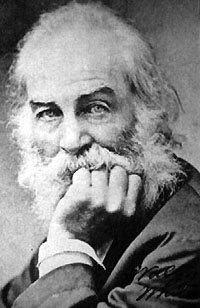 Walt Whitman was born on May 31, 1819, on the West Hills of Long Island, New York. His mother, Louisa Van Velsor, of Dutch descent and Quaker faith, whom he adored, was barely literate. She never read his poetry, but gave him unconditional love. His father of English lineage, was a carpenter and builder of houses, and a stern disciplinarian. His main claim to fame was his friendship with Tom Paine, whose pamphlet Common Sense (1776), urging the colonists to throw off English domination was in his sparse library. It is doubtful that his father read any of his son’s poetry, or would have understood it if he had. The senior Walt was too burdened with the struggle to support his ever-growing family of nine children, four of whom were handicapped.
Walt Whitman was born on May 31, 1819, on the West Hills of Long Island, New York. His mother, Louisa Van Velsor, of Dutch descent and Quaker faith, whom he adored, was barely literate. She never read his poetry, but gave him unconditional love. His father of English lineage, was a carpenter and builder of houses, and a stern disciplinarian. His main claim to fame was his friendship with Tom Paine, whose pamphlet Common Sense (1776), urging the colonists to throw off English domination was in his sparse library. It is doubtful that his father read any of his son’s poetry, or would have understood it if he had. The senior Walt was too burdened with the struggle to support his ever-growing family of nine children, four of whom were handicapped.
Young Walt, the second of nine, was withdrawn from public school at the age of eleven to help support the family. At the age of twelve he started to learn the printer’s trade, and fell in love with the written and printed word. He was mainly self-taught. He read voraciously, and became acquainted with Homer, Dante, Shakespeare and Scott early in life. He knew the Bible thoroughly, and as a God-intoxicated poet, desired to inaugurate a religion uniting all of humanity in bonds of friendship.
In 1836, at the age of 17, he began his career as an innovative teacher in the one-room school houses of Long Island. He permitted his students to call him by his first name, and devised learning games for them in arithmetic and spelling. He continued to teach school until 1841, when he turned to journalism as a full-time career. He soon became editor for a number of Brooklyn and New York papers. From 1846 to 1847 Whitman was the editor of the Brooklyn Daily Eagle. Whitman went to New Orleans in 1848, where he was editor for a brief time of the “New Orleans Crescent”. In that city he had become fascinated with the French language. Many of his poems contain words of French derivation. It was in New Orleans that he experienced at first hand the viciousness of slavery in the slave markets of that city.
On his return to Brooklyn in the fall of 1848, he founded a “free soil” newspaper, the “Brooklyn Freeman”. Between 1848 and 1855 he developed the style of poetry that so astonished Ralph Waldo Emerson. When the poet’s Leaves Of Grass reached him as a gift in July, 1855, the Dean of American Letters thanked him for “the wonderful gift” and said that he rubbed his eyes a little “to see if the sunbeam was no illusion.” Walt Whitman had been unknown to Emerson prior to that occasion. The “sunbeam” that illuminated a great deal of Whitman’s poetry was Music. It was one of the major sources of his inspiration. Many of his four hundred poems contain musical terms, names of instruments, and names of composers. He insisted that music was “greater than wealth, greater than buildings, ships, religions, paintings.” In his final essay written one year before his death in 1891, he sums up his struggles of thirty years to write Leaves of Grass. The opening paragraph of his self-evaluation “A Backward Glance O’er Travel’d Road,” begins with his reminiscences of “the best of songs heard.” His concluding comments again return to thoughts about music, saying that “the strongest and sweetest songs remain yet to be sung.”
“When Lilacs Last in the Dooryard Bloomed” and “O Captain! My Captain!” (1866) are two of his more famous poems. A poet who was ardently singing on life and himself, Whitman is today claimed as one of the few truly great American men of letters.
